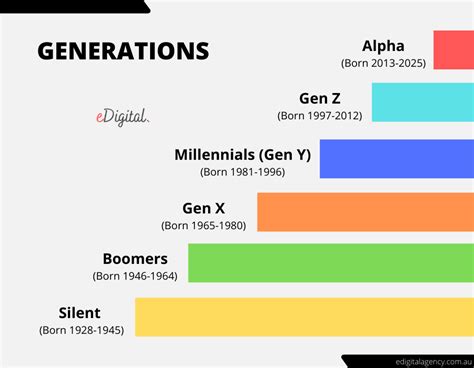1973-2024: Generations Apart? Find Out Now.
The years between 1973 and 2024 encompass a significant period of societal, technological, and cultural transformation. Spanning nearly five decades, this timeframe bridges multiple generations, each shaped by unique historical events and technological advancements. Understanding these generational differences is crucial for navigating interpersonal relationships, workplace dynamics, and even political discourse. This article explores the key distinctions between generations born within this period, examining their defining characteristics and how these differences impact our world today.
Understanding Generational Cohorts
Before diving into the specifics, it's essential to define the generations we'll be discussing. While the exact boundaries are often debated, a widely accepted framework includes:
- Generation X (Gen X): Born roughly between 1965 and 1980. This generation witnessed the rise of personal computers and the beginning of the internet age.
- Millennials (Generation Y): Born approximately between 1981 and 1996. They grew up with the internet and witnessed its explosive growth.
- Generation Z (Gen Z): Born roughly between 1997 and 2012. This generation is the first to have grown up entirely in the digital age.
- Generation Alpha (Gen Alpha): Born from 2013 onwards. This generation is still developing, but early indicators suggest a unique set of characteristics.
How Do These Generations Differ?
While generalizations about entire generations can be oversimplifications, certain trends and characteristics emerge when comparing these groups.
1. Technological Proficiency
- Gen X: Adapted to technology as it emerged, often demonstrating a pragmatic approach to its use.
- Millennials: Grew up with readily available technology, often exhibiting high levels of digital fluency.
- Gen Z: Native digital users, demonstrating an unparalleled comfort level with technology across all aspects of their lives.
- Gen Alpha: Growing up in a world saturated with advanced technologies; their relationship with technology is still evolving but promises to be even more integrated than previous generations.
2. Work Ethic and Career Aspirations
- Gen X: Often characterized by a strong work ethic, valuing independence and self-reliance.
- Millennials: Value work-life balance and often seek purpose-driven careers.
- Gen Z: Prioritize mental health and are more likely to seek flexible work arrangements.
- Gen Alpha: Their career aspirations are still forming, but early indicators suggest a focus on sustainability and social impact.
3. Communication Styles
- Gen X: Often prefer direct and efficient communication.
- Millennials: Comfortable with both digital and face-to-face communication, valuing collaboration and inclusivity.
- Gen Z: Highly comfortable with digital communication, utilizing various platforms and channels. They may value brevity and visual communication.
- Gen Alpha: Their communication styles are still evolving, but digital fluency will likely dominate.
4. Values and Priorities
- Gen X: Value independence, self-reliance, and practicality.
- Millennials: Value collaboration, community, and social responsibility.
- Gen Z: Value authenticity, inclusivity, and mental health. They are also increasingly concerned about climate change and social justice.
- Gen Alpha: Their values are still developing but are likely to be shaped by the pressing global challenges they inherit.
What About the Impact of Major Events?
Each generation has been profoundly impacted by major historical events. Gen X experienced the Cold War, AIDS epidemic, and economic recessions. Millennials witnessed 9/11 and the Great Recession. Gen Z navigated the rise of social media, climate change concerns, and a global pandemic. These formative experiences shape their perspectives and worldviews.
How Do These Differences Affect Us Today?
Understanding these generational differences is vital for effective communication and collaboration in various settings, from the workplace to family dynamics. Bridging these gaps requires empathy, understanding, and a willingness to learn from each other's perspectives. Open communication, active listening, and a conscious effort to appreciate the unique experiences and values of each generation are essential for building strong relationships and navigating the complexities of a diverse society.
Frequently Asked Questions (FAQ)
What are the biggest differences between Millennials and Gen Z? While both generations are digitally native, Gen Z is characterized by a greater emphasis on authenticity, mental health, and social activism, compared to Millennials' focus on work-life balance and collaborative efforts.
How will Gen Alpha shape the future? It's too early to definitively answer this, but Gen Alpha's upbringing in a technology-driven, environmentally conscious world suggests they will prioritize sustainability, social justice, and technological innovation in unprecedented ways.
Are generational differences always a source of conflict? Not necessarily. Understanding and appreciating the strengths and perspectives of each generation can lead to greater collaboration and innovation. However, a lack of understanding can certainly lead to conflict.
This exploration of the generations spanning 1973-2024 provides a glimpse into the diverse tapestry of human experience and the ongoing evolution of society. By recognizing and understanding these generational differences, we can build a more inclusive, collaborative, and successful future.

